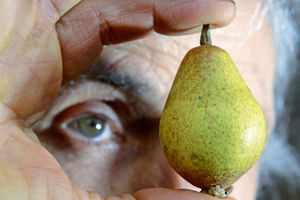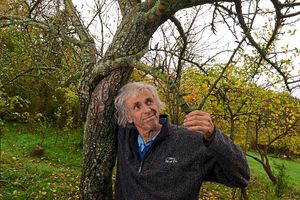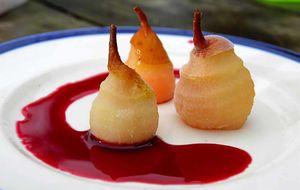VIDEO: Tettenhall Dick is back with a bang
It's one of our rarest fruits with one of the rudest names - and now (don't laugh) the Tettenhall Dick is popping up again.

Before you ask, it's an exceptionally tasty and rare pear grown mainly in South Staffordshire.
"They look stunning and taste fantastic," says Paul Hand who has spearheaded a major re-planting of 1,000 Tettenhall Dick trees around the Black Country.
He adds: "We have planted a large number and have succeeded in keeping the Tettenhall Dick pear as part of the Black Country landscape."
Tettenhall Dick trees were found in abundance along the streets and in back gardens of the Black Country.

But after the Second World War their popularity plummeted with trees torn down for redevelopment and a culture shift away from people growing their own food.
Mr Hand has fond memories of scrumping – that's stealing – the pears in his childhood. "At the turn of the millennium I decided to get off my backside and do something," he said.
"I felt it was important .
"I went to Regis School in Tettenhall and I remember seeing a JCB ripping up the trees I used to scrump and the image stayed with me ever since then."
From his home in Leintwardine, on the Herefordshire and Shropshire border, he is making Tettenhall Dick wine and next year hopes to produce Tettenhall Dick Perry – a firm Black Country favourite from bygone times.

He said: "They are part of Black Country history. As a schoolboy in Castlecroft I would scrump them. Because you would bite into them before they were ripe they were hard, hence the saying 'Tettenhall Dick, hard as brick'.
"They didn't have a very long shelf life and were not fantastically juicy.
"It is a variety of pear that is more than 500 years old and from the pre-industrial Midlands. It spread far and wide with a people telling me they had them in Cannock and as far away as Lichfield. They were in everyone's gardens.
"My mother would never bottle them, so recently I thought I would try it and they tasted superb – just the sort of thing you would eat at a posh restaurant.
"They are real gourmet quality. They are absolutely fabulous. I find if you cook them for a few minutes and then put them in the freezer to preserve them it has the same effect and it is not as fiddly."

He has planted a Tettenhall Dick tree in Bantock Park in memory of his mother and 60 in Baggeridge Country Park.
A further 50 are in a fruit farm which he hopes will start selling them.
Hundreds of others have been planted at schools and homes.
To re-introduce the pear trees he had to combine young wood samples from a Tettenhall Dick tree with rootstock – a process known as grafting.
He collected samples from Regis Road in Tettenhall and The Straits in Gornal.
He said: "You slice and bind it. The trees don't grow from seeds. You have to join the wood with the roots and it will combine and grow. It is just like how Bramley Apples are made and all come from the original trees. So the Tettenhall Dick we grow today can be traced back to the time of just after the Norman Conquests."
Mr Hand runs a charity, Bees & Trees, that specialises in rare fruit. As well as lecturing he also trains people on plant grafting.
He is planning to hold a Tettenhall Dick party next year around September when they will be ripe to pick from the trees. He said many people would make perry and wine from the pear but after the Second World War the fell in popularity. Indeed he is making his own wine and next year plans to produce Tettenhall Dick perry. He said: "It is my opinion that they originated in the Manor of Perton. The Manor of Perton disappeared and the pear got called Tettenhall Dick being the next place along." Many people believe Perton's name derived from the fruit, 'Pear-town'.
"Pears have been in the doldrums for a long time," he said.
"But I expect they will make a comeback. Joan Morgan who wrote the Book of Apples which has become the Bible of apples has just published the Book of Pears. The Tettenhall Dick is included and I expect that will help. People are now interested in food and I am sure this will help the Tettenhall Dick pear become trendy."




